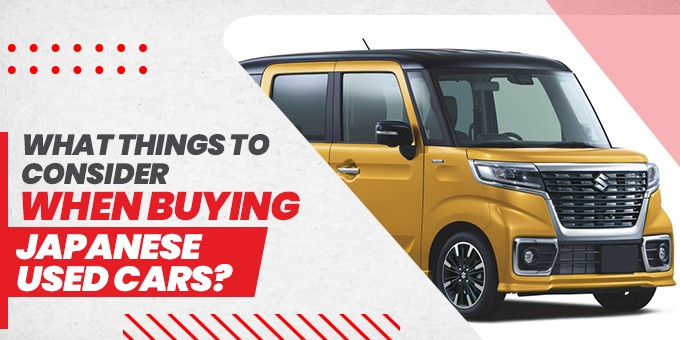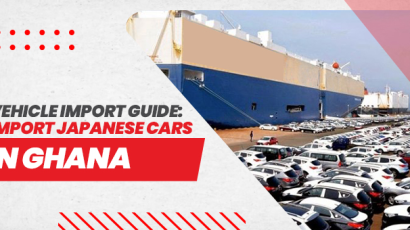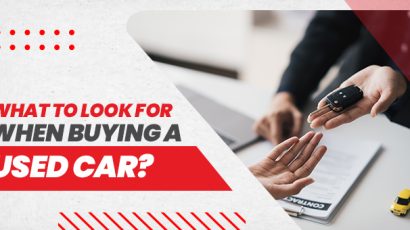
The allure of Japanese used cars is undeniable. These automobiles are highly affordable and are renowned for their dependability, fuel efficiency, and innovative technology. But navigating the world of Japanese used car imports can be daunting.
Fear not, car enthusiasts! This thorough guide gives you the knowledge you need to make an informed, confident purchase. Take a look and learn how to have your ideal Japanese ride secured!
Important Things to Consider When Buying Japanese Used Cars
Vehicle History and Documentation
Inspection Reports: Japanese used cars undergo rigorous inspections if you’re purchasing from SBT Japan at designated intervals. Therefore, you must ask for translated copies of these reports, scrutinizing for accident history, odometer discrepancies, and any potential mechanical issues. A trustworthy importer will walk you through the procedure and provide you with all the necessary information.
Export Certificate: This official document verifies the vehicle’s condition, mileage, and export eligibility. Ensure its authenticity and consistency with the inspection reports.
Title and Registration: A clean title guarantees ownership and a hassle-free import process. Verify the title’s validity through the Japanese authorities and ensure all necessary registration documents are present.
Auction History: Be mindful of ex-taxi or rental vehicles, which may have experienced higher wear and tear. Research the car’s auction history and inquire about its previous usage.
Vehicle Condition and Specifications
Exterior and Interior: Scrutinize the Japanese used cars for sale you are considering getting. You should look for dents, rust, paintwork inconsistencies, and worn-out upholstery. Moreover, check for the proper functioning of all lights, mirrors, and interior features.
Engine and Transmission: Another thing to do is listen for unusual noises, vibrations, or leaks. Request a test drive to assess the engine’s responsiveness, transmission smoothness, and braking performance.
Mileage and Age: Consider the age and maintenance history of the automobile, even if low mileage is preferred. Compared to a newer vehicle with dubious maintenance, an older vehicle with flawless service history can be a superior option.
Modifications and Upgrades: Be cautious of heavily modified cars, as they may impact performance, reliability, and legality in your country. Always clear all your doubts and confusions with an SBT Japan agent, as they are there to help you.
Spare Parts and Availability: Ensure readily available spare parts for the specific model and year you choose. This minimizes downtime and maintenance headaches.
Registration and Import Process
Import Regulations: Learn about your nation’s import laws, such as minimum age restrictions, safety rules, and emissions limits. Your agent will usually brief you about the import regulations, but if you are still unclear about something, then it is better to ask.
Import Agent: When you’re purchasing used cars for sale in Zimbabwe, there can be complex paperwork, customs clearance, and transportation logistics. Make sure you trust the import agency and that you are in sync with them.
Shipping and Insurance: Choose a reliable shipping company like SBT Zimbabwe to import your used cars for sale in Zimbabwe. In addition, you need to get full coverage insurance to safeguard your investment while it’s in transit.
Taxes and Duties: Be prepared for potential import taxes and duties based on the car’s value and origin. You can check with the agent before finalizing your purchase to know the exact details for taxes and duties that will be applicable. It is preferable to ask questions because the vehicle’s pricing frequently covers these.
Registration and Licensing: Once the car arrives, complete the necessary registration and licensing procedures to operate it legally on your roads.
Additional Considerations
While the core aspects of vehicle history, condition, and import logistics are vital, several additional considerations can refine your journey. Moreover, it can ensure a truly satisfying purchase of Japanese used cars. Let’s explore these bonus tips for a stress-free ride:
Budget and Financing
Know your limits: Create a reasonable spending plan that accounts for the purchase price, import duties, taxes, insurance, registration fees, and any necessary upkeep. Don’t overstretch yourself financially. Once you know your budget, only then can you purchase a suitable vehicle that fits your needs.
Financing options: Research financing options offered by banks, credit unions, or specialized car import companies. Compare interest rates and repayment terms to secure the best deal.
Hidden costs: Remember to factor in unexpected expenses like shipping delays, additional repairs, or cosmetic touch-ups. Anything can come up at the last minute, so it is always good to have a buffer in your budget for these eventualities.
Warranty and Service
Extended warranty: For additional peace of mind, especially for older cars or models with complicated equipment, think about getting an extended warranty. Ensure the warranty provides adequate coverage for potential repairs.
Authorized service centers: Look for the approved service providers in your area for the model you have selected. This ensures access to qualified technicians and genuine spare parts for proper maintenance and repairs.
DIY maintenance skills: If you’re handy, assess your comfort level with basic maintenance tasks like oil changes, tire rotations, and battery replacements. This can save you money on service costs in the long run.
Local Support and Community
Online forums and communities: Become a member of local Japanese used vehicle forums and communities online. Make connections with other fans, trade stories, and ask for guidance on certain models, upkeep suggestions, and regional laws. Therefore, getting a better idea and insight into the used cars from Japan you plan to purchase
Owner reviews and ratings: Read online reviews and ratings from other owners of the same model you’re considering. This offers insightful information on performance in real-world settings, dependability, and typical problems to be aware of.
Local car clubs and events: Participate in local car club events and gatherings. Hence allowing you to network with other owners, test-drive different models, and gain valuable firsthand knowledge from experienced individuals.
Pre-Purchase Inspection
Invest in peace of mind: Don’t skimp on a pre-purchase inspection by a qualified mechanic familiar with Japanese used cars for sale. This comprehensive inspection can uncover hidden issues like frame damage, engine problems, or electrical faults that could save you from costly repairs down the line.
Negotiation leverage: A pre-purchase inspection report provides valuable leverage when negotiating the final price with the seller. Use the identified issues as bargaining chips to secure a fair deal.
Second opinion: To be absolutely sure, obtain a second opinion from another mechanic if the results of the initial check cause you apprehension.
Remember, a little additional planning and research can go a long way in ensuring a smooth and satisfying Japanese used cars for sale purchase. By following these tips and utilizing the resources available, you can confidently navigate the process and find the perfect vehicle to fuel your automotive dreams.
Bottom Line
In essence, buying Japanese used cars can be an exhilarating journey, leading you to a reliable, fuel-efficient, and technologically advanced vehicle at a great price. However, by purchasing from SBT Zimbabwe and carefully considering the factors outlined in this guide, you can navigate the process with confidence and secure your dream car. So, buckle up, research diligently, and enjoy the smooth ride to owning a piece of Japanese automotive excellence!











